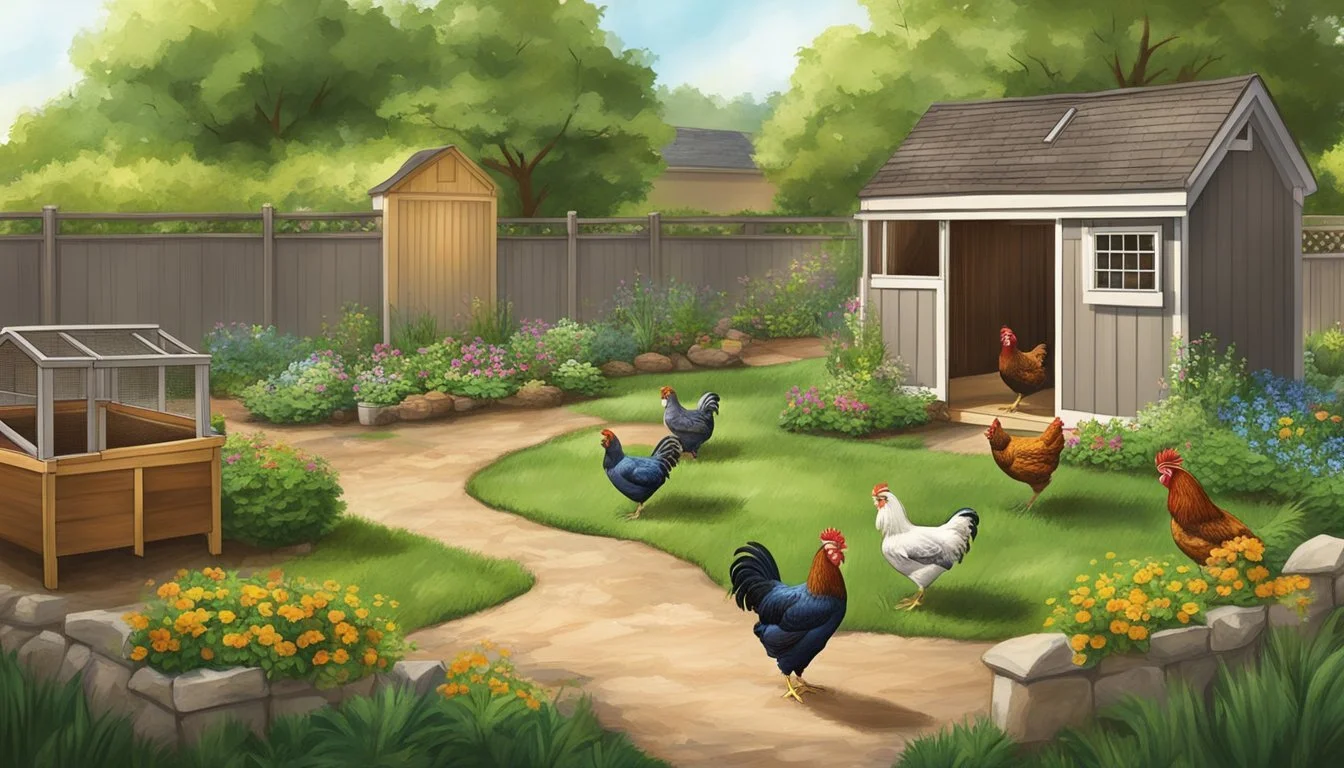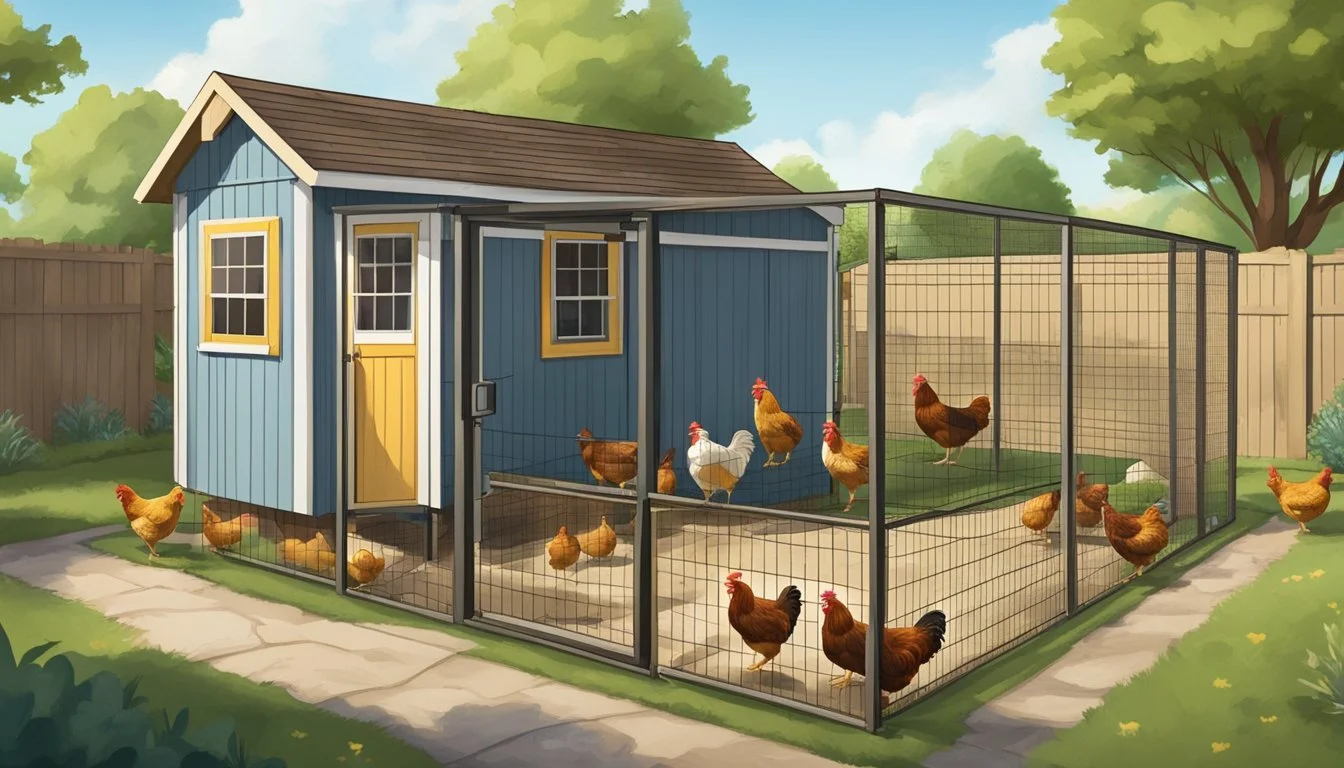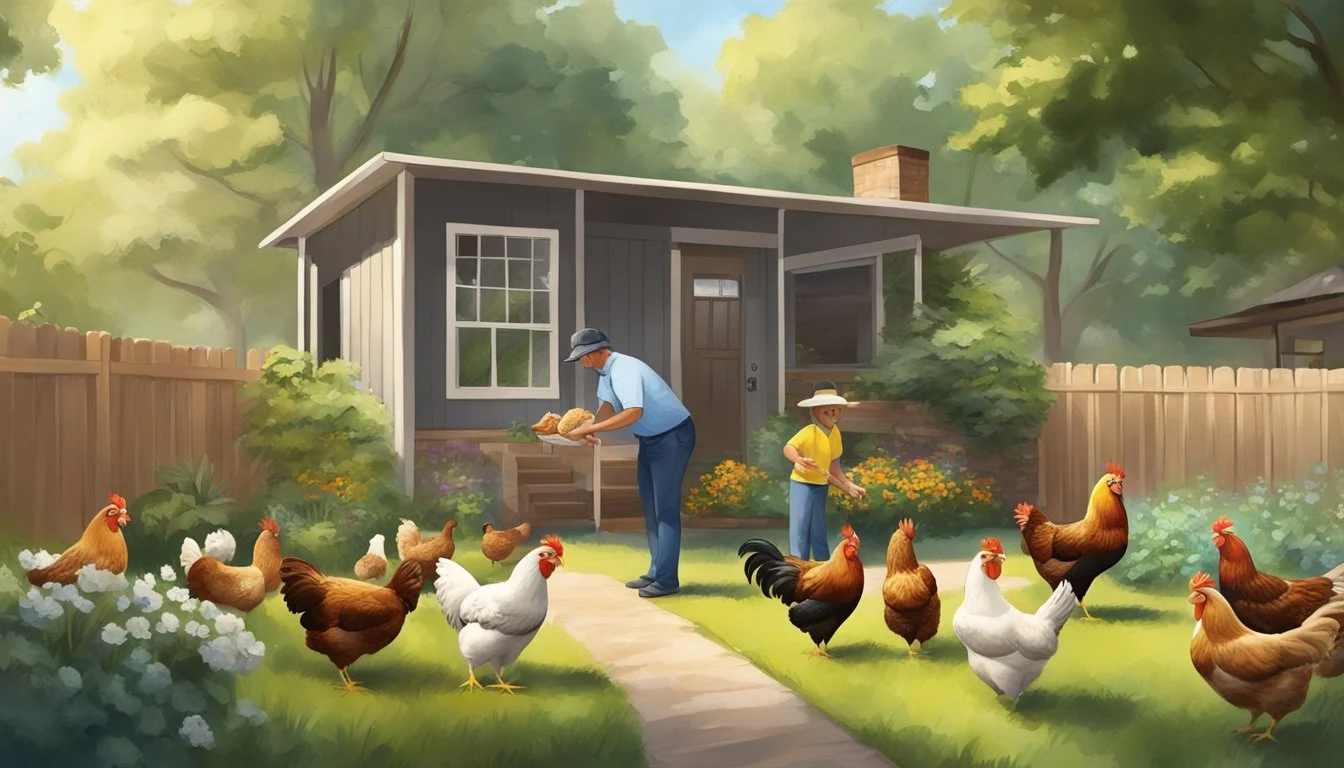Keeping Backyard Chickens in Richardson, TX
Essential Tips for Urban Poultry Farming
Raising backyard chickens has become a popular endeavor among residents of Richardson, TX. The city acknowledges the growing interest in urban agriculture and provides specific guidelines for the proper management of backyard poultry. Chickens, when housed and cared for appropriately, can be a source of fresh eggs and can contribute to sustainable living practices within an urban environment.
In Richardson, homeowners are allowed to keep chickens with certain conditions meant to maintain public health and safety. The local ordinances require that chickens be kept within a fully enclosed yard or a coop with protection from predators, and that the environment for the hens includes a nest box for laying eggs. It is important for potential and current chicken owners in Richardson to familiarize themselves with the specific city codes to ensure they are compliant.
The maintenance of a clean space for the chickens is crucial, not only for the health of the birds but to prevent nuisances to neighbors, such as offensive odors or the attraction of flies. The city's regulations aim to balance the benefits of raising chickens with the need to keep the community's living conditions pleasant for all residents. As such, Richardson's approach to backyard chickens is a mix of leniency towards personal freedom and strictness on public health and neighborhood well-being.
Understanding City Ordinances and State Law
It's essential for residents to familiarize themselves with the specific city ordinances in Richardson and state laws in Texas governing the keeping of backyard chickens to ensure legal compliance and good neighbor relations.
City Regulations in Richardson
In Richardson, Texas, city ordinances require that chickens be kept in a fully-fenced enclosure or yard during the day to protect them from predators and prevent them from roaming freely. The enclosure must include a nestbox for hens to lay their eggs.
State Regulations in Texas
At the state level, Texas does not prohibit raising backyard chickens, but statewide regulations guide animal husbandry practices, and local municipalities like Richardson set specific rules. It is important for individuals to check both state and local regulations before starting their flock.
Nuisance Laws and Neighbors
Richardson city ordinances, specifically Sec. 14-2, address nuisances and make it clear that chickens must not be kept in a way that is offensive or produces odors that could be bothersome to neighbors. It is crucial to keep chicken coops clean to prevent attracting flies and generating unpleasant smells.
Permit Requirements and Fees
Local laws in Richardson may require residents to obtain a permit for backyard chickens, including possible fees. While the search results did not specify the exact requirements and costs, they did imply the need for compliance with local standards. Residents should inquire with the city for the most current permit requirements and fee structures, as these can have financial implications and the risk of fines or penalties for non-compliance.
Setting Up Your Chicken Coop
When establishing a chicken coop in Richardson, TX, security, cleanliness, and appropriate space are paramount considerations to ensure the health and safety of the chickens.
Designing a Secure and Sanitary Coop
A secure chicken coop requires solid walls, a sturdy roof, and measures to prevent the entrance of wildlife. The coop must be regularly cleaned to prevent odors and the proliferation of disease-carrying pests. Surfaces should be smooth to allow for easy disinfection, and materials used must withstand rigorous cleaning. Proper drainage is crucial to avoid standing water which can breed bacteria and attract insects.
Walls & Roof: Must be solid and secure.
Cleaning: Smooth surfaces for easy disinfection.
Drainage: Must be effective to prevent water accumulation.
Providing Adequate Space and Ventilation
Chickens need room to roam and exercise. Space allocation should be at least 3-4 square feet inside the coop per chicken, and 8-10 square feet in the outdoor enclosed area or run. Adequate ventilation is essential to remove moisture and ammonia, preventing respiratory issues. Ventilation doesn't mean drafts; chickens require insulation against the elements, aligning with Texas weather conditions.
Space per Chicken:
Inside Coop: 3-4 square feet
Outside Run: 8-10 square feet
Ventilation: Essential for air quality, not to be confused with drafts.
Protecting Against Predators and Disease
Protective measures against predators include fencing the coop and run—burying the fence about 12 inches underground to thwart digging predators such as raccoons or foxes. Overhead protection in the run prevents attacks from flying predators. To minimize disease risks, design the coop for easy access to all areas for effective monitoring of chicken health and sanitary conditions.
Predator Protection: Fencing buried 12 inches underground, overhead coverage in the run.
Health Monitoring: Design allowing access to all areas for health and sanitation checks.
Daily Care and Maintenance
Effective daily care and maintenance of backyard chickens in Richardson, TX, are essential for a healthy flock. There are specific tasks and considerations that one must attentively manage every day to ensure the chickens' well-being.
Feeding and Watering Your Chickens
Chickens require a consistent supply of fresh water and a balanced diet to thrive. One should provide a variety of grains, seeds, and kitchen scraps to supplement their feed, ensuring they receive all the necessary nutrients. Fresh water must be available at all times, and feeders should be filled daily to avoid food scarcity.
Food: Offer a mix of layer pellets and grains.
Water: Check and refill water containers twice a day.
Cleaning and Waste Management
Keeping the coop clean is crucial for the health of the chickens and the sanitary conditions of the environment. The coop should be swept daily to remove droppings and spilled feed, which can attract pests. Waste should be collected and disposed of properly, or it can be composted as it is an excellent fertilizer for gardens.
Daily: Remove droppings and refresh the coop's bedding.
Weekly: Perform a more thorough cleaning and inspect for any signs of pests.
Health Checks and Veterinary Care
Observing the flock daily allows for early detection of potential health issues. One should look for signs of illness such as lethargy, abnormal droppings, or changes in egg production. It's advisable to establish a relationship with a veterinarian who is experienced in avian medicine for regular check-ups and in case of emergencies.
Daily Health Checks: Observe each chicken for any signs of distress or illness.
Veterinary Care: Schedule regular check-ups and vaccinations as needed.
Understanding Livestock and Fowl Regulations
In Richardson, Texas, the approach to regulating fowl, such as chickens and ducks, as well as small livestock is governed by local ordinances and requirements focusing on cleanliness, nuisance prevention, and space.
Differences Between Chickens, Ducks, and Other Fowl
Chickens: In Richardson, there are no specific location restrictions for keeping chickens, but they must be kept in hygienic conditions to prevent odors and the proliferation of flies. Richardson does not specify a limit to the number of chickens a resident can keep.
Ducks and Other Fowl: Though the search results do not detail regulations for ducks and other fowl specifically within Richardson, typically, these birds are subject to similar restrictions as chickens, focusing on sanitary conditions and nuisance prevention.
Keeping Roosters and Noise Management
Roosters often contribute to noise complaints and can be considered nuisances in urban settings. While the information on rooster regulations in Richardson specifically was not provided, residents considering keeping roosters should verify local ordinances related to noise control to ensure compliance.
Small Livestock in Urban Settings
Urban Chickens and Fowl: Although the state law in Texas does not expressly regulate chickens and fowl, it's essential to consult city ordinances, which typically govern the keeping of these animals within city limits.
Small Livestock: This includes animals such as goats, sheep, and rabbits. Details for Richardson were not provided, but generally, city ordinances will stipulate the conditions under which small livestock may be kept, often with consideration for lot size and proximity to neighbors' dwellings. For cities like Mansfield, the local regulations are more likely to outline specific conditions related to these species. Residents must adhere to these guidelines to ensure they are in compliance when keeping small livestock.
Legal Considerations and Community Relations
In Richardson, Texas, the ability to keep backyard chickens hinges on navigating local ordinances and maintaining cordial community relations. Homeowners must consider the strictures of homeowners associations as well as ensure their activities do not become a nuisance to their neighbors.
Homeowners Association and Deed Restrictions
Homeowners associations (HOAs) in Texas have the authority to enact and enforce regulations concerning the keeping of backyard chickens. These rules can include bans or limitations on the number of chickens, coop provisions, and property usage. Residents should review their deed restrictions and consult with their HOA before acquiring chickens to ensure compliance with all community guidelines.
Checklist for HOA Compliance:
Review HOA covenants for any prohibitions on poultry.
Determine any specific coop construction standards.
Ascertain limits on the number of allowed chickens.
Adhering to these regulations is crucial as non-compliance can lead to penalties or the forced removal of the birds.
Managing Odors and Keeping Good Relations
The onus falls on chicken owners to prevent their birds from becoming a source of offensive odors or disturbances. Maintaining a clean coop and proper waste disposal is essential to avoid attracting flies or generating unpleasant smells that could impact neighboring residences.
Strategies for Odor Management:
Regular cleaning of the coop and removal of waste.
Adequate ventilation to reduce moisture and odor build-up.
Composting chicken waste appropriately away from neighbor's properties.
Additionally, keeping chickens should not interfere with the enjoyment of shared spaces or infringe upon the sensibilities of those in proximity to schools, churches, or other community areas. Engaging with neighbors and addressing concerns proactively fosters good relations and positions chicken-keeping as a responsible and community-friendly practice. Local animal services provide guidance on best practices for keeping animals within urban settings, which can be instrumental in managing relations with those around you.
Local Resources and Support Networks
For Richardson, TX residents, the local resources and support networks are vital for ensuring successful backyard chicken keeping. They provide a platform for exchange of ideas, sharing experiences, and offering advice specific to the local context and regulations.
Richardson Backyard Chicken Forum
The Richardson Backyard Chicken Forum is an invaluable hub for enthusiasts and seasoned chicken keepers alike. This community-driven platform allows Richardson residents to:
Share insights on local regulations and best practices
Access a wealth of crowd-sourced knowledge on chicken care
It's a dedicated space for Richardson citizens to connect over shared experiences, providing support for both novice and experienced poultry enthusiasts.
Texas Urban Chicken-Keeping Communities
Across major Texas cities, urban chicken-keeping communities thrive, offering extensive support networks for individuals interested in raising chickens. Key communities include:
Dallas/Fort Worth Poultry Club: Offers resources for Dallas and Fort Worth residents.
Austin Backyard Poultry Meetup: Austin's active community for backyard chicken keepers.
Houston Urban Chicken Farmers Group: Connects Houstonians with a passion for poultry.
Furthermore, cities such as Plano, Arlington, Irving, Lewisville, Grand Prairie, and neighboring areas like Murphy, Wylie, and Garland have niche forums and social media groups where residents can seek advice and share experiences. Whether it's dealing with the hot Texas climate or finding the best feed providers, these communities are ready to assist.








